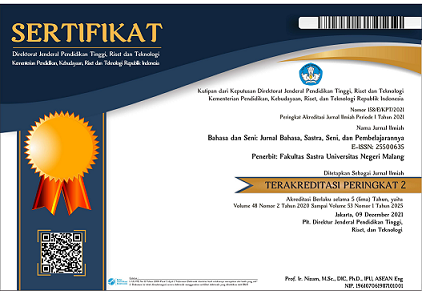The translation of personal pronouns in French discourses into Indonesian
Abstract
The translation of personal pronouns in French discourses into Indonesian
Translation is the transfer of a message from a source-language text into an equivalent target-language text. Cultural differences between a source language and a target language always leave marks on a translation process. Language as part of culture influences the minds of its speakers, especially translators. French literary texts (as source texts) and their Indonesian translations (target texts) can provide examples of the differences between the reasoning process of French literary writers and that of Indonesian translators, particularly in the translation of pronouns with this topic being the focus of this present study. By carefully investigating how pronouns are translated in three French novels – Michael Tournier’s (1971) Vendredi ou la Vie Sauvage, Amin Maalout’s (1993) Le Rocher de Tanios, Gustave Flaubert’s (1972) Madame Bovary – this study’s analysis shows that the translation of French pronouns in literary texts into Indonesian results in various forms, namely pronouns, lexical equivalences, repetitions, and substitutions. The translation of the pronoun on, which signifies passive voice, results in equivalence in meaning despite the absence of formal correspondence, and thus conjures the Indonesian passive diatheses di- and ter-.
Keywords: translation, pronoun, equivalence, correspondence
Strategi penerjemahan pronomina persona pada wacana bahasa Prancis ke dalam bahasa Indonesia
Terjemahan adalah pengalihan pesan dari teks bahasa sumber ke teks bahasa target yang sepadan. Perbedaan budaya antara bahasa sumber dan bahasa sasaran selalu meninggalkan permasalahan pada proses penerjemahan. Bahasa sebagai bagian dari budaya mempengaruhi pikiran penuturnya, terutama penerjemah. Teks sastra Prancis (sebagai teks sumber) dan terjemahan bahasa Indonesianya (teks sasaran) dapat memberikan contoh perbedaan proses nalar penulis sastra Prancis dan penerjemah Indonesia, khususnya dalam penerjemahan kata ganti, di mana topik ini menjadi fokus dalam penelitian ini. Melalui pengamatan yang mendalam terhadap tiga novel – Michael Tournier’s (1971) Vendredi ou la Vie Sauvage, Amin Maalout’s (1993) Le Rocher de Tanios, Gustave Flaubert’s (1972) Madame Bovary – analisis penelitian ini menunjukkan bahwa penerjemahan kata ganti orang bahasa Prancis dalam teks sastra ke dalam bahasa Indonesia menghasilkan berbagai bentuk, yaitu kata ganti, padanan leksikal, pengulangan, dan penggantian. Terjemahan kata ganti on, yang menandakan suara pasif, menghasilkan kesetaraan makna meskipun tidak ada korespondensi formal, dan dengan demikian memunculkan diatesis pasif bahasa Indonesia di- dan ter-.
Kata kunci: terjemahan, kata ganti, padanan, kesejajaran
Full Text:
PDFReferences
Benveniste, E. (1966). Problèmes de linguistique générale. Gallimard.
Carpentier, J., & Lebrun, F. (2011). Sejarah Prancis dari zaman prasejarah hingga akhir abad ke-20 (T. Pasuhuk, Trans.). Kepustakaan Populer Gramedia (KPG).
Catford, J. C. (1965). A linguistic theory of translation. Oxford University Press.
Charaudeau, P. (1992). Grammaire du sens et de l’expression. Hachette.
Creswell, J. W. (2011). Educational research: Planning, conducting, and evaluating quanti-tative and qualitative research. Pearson Education.
Flaubert, G. (1972). Madame Bovary. Gallimard.
Flaubert, G. (1990). Nyonya Bovary (W. Arifin, Trans.). PT Dunia Pustaka Jaya.
Furet, F., & Richet, D. (1989). Revolusi Prancis. Gadjah Mada University.
Gjesdal, A. M. (2008). Étude sémantique du pronom ON dans une perspective textuelle et contextuelle. [Dissertation, Université de Bergen]. https://tel.archives-ouvertes.fr/tel-00335306
Guillemette, L., & Lévesque, C. (2016). Gérard Genette: Narratologie. Signosemio. http://www.signosemio.com/genette/narratologie.asp
Hoed, B. H. (1993). Kala dalam novel: Fungsi dan penerjemahannya: Sebuah kajian ten-tang penerjemahan Perancis-Indonesia. Gadjah Mada University Press.
House, J. (2002). Universality versus culture specificity in translation. In A. Riccardi (Ed.), Translation studies: Perspectives on an emerging discipline (pp. 92–110). Cambridge University Press.
Lolong, A. D. (1989). Padanan pronomina jamak Kami dan Kita dalam Bahasa Prancis [Undergraduate Thesis]. Universitas Indonesia.
Luxemburg, J. van, Bal, M., & Weststejn, W. G. (1992). Pengantar ilmu sastra (D. Hartoko, Trans.). Gramedia.
Maalouf, A. (1993). Le rocher de Tanios. Grasset.
Maalouf, A. (1999). Cadas Tanios (I. S. Husen, Trans.). Yayasan Obor Indonesia.
Moleong, L. J. (2007). Metodologi penelitian kualitatif. Remaja Rosdakarya.
Newmark, P. (1988). A textbook of translation. Prentice Hall.
Nida, E. A., & Taber, C. R. (1964). The theory and practice of translation. Brill.
Ohlson, L. F. (2019). Zombies lost in translation. The translation from English to Spanish of (de)humanizing pronouns. Revista de Lingüística y Lenguas Aplicadas, 14(1), 91–103. https://doi.org/10.4995/rlyla.2019.10749
Prihantoro. (2013). On translating 2nd person pronoun (English and Indonesian): A case study on BPPT Parallel Corpus. International Conference on Education and Language (ICEL), 2, 417–422. http://artikel.ubl.ac.id/index.php/icel/article/view/230
Rabelais, F. (1553). Gargantua. Libraire Armand Colin.
Rachmawati, R. (2012). Penerjemahan pronomina dan nama diri: Bahasa Indonesia ke Ba-hasa Inggris dan sebaliknya. MADAH, 3(2), 133–140. https://doi.org/10.31503/madah.v3i2.24
Rickard, P. (1989). A history of the French language (2nd ed.). Routledge.
Setyasari, G. E. (2005). Penerjemahan pronomina tak tentu on dalam novel-novel karya Albert Camus: L’Etranger yang dialihbahasakan dalam “Orang Asing” oleh Apsanti Djokosujatno dan La Peste yang dialihbahasakan dalam “Sampar” oleh Nh. Dini. [Oth-er, Universitas Negeri Semarang]. http://lib.unnes.ac.id/3505/
Sapir, E. (1931). Conceptual categories in Primitive Languages. Science, 74(1927), 571–578. https://doi.org/10.1126/science.74.1927.571
Slobin, D. I. (2003). Language and thought online: Cognitive consequences of linguistic rela-tivity. In D. Gentner & S. Goldin-Meadow (Eds.), Language in mind: Advances in the study of language and thought (pp. 157–191). MIT Press.
Suriasumantri, J. S. (1999). Ilmu dalam perspektif. Yayasan Obor Indonesia.
Tamine, J. G. (2018). La grammaire. Armand Colin.
Tournier, M. (1971). Vendredi ou la vie sauvage. Gallimard.
Tournier, M. (1992). Kehidupan Liar (I. S. Husen, Trans.). Pustaka Jaya.
Whorf, B. L. (1956). Language, thought, and reality: Selected writings of Benjamin Lee Whorf (J. B. Carroll, Ed.). MIT Press.
Yao, Y. (2018). Research on translation of English pronouns. In 2018 7th International Workshop on Arts, Culture, Literature, and Education (IWACLE 2018) (pp. 76–79). Fran-cis Academic Press.
DOI: http://dx.doi.org/10.17977/um015v50i12022p36
Refbacks
- There are currently no refbacks.

This work is licensed under a Creative Commons Attribution 4.0 International License.

Dear Sir/Madam
We appreciate your continued confidence and trust in Bahasa dan Seni: Jurnal Bahasa, Sastra, Seni, dan Pengajarannya (JBS). In order to enhance the service, readability, and quality of JBS publications, we will be transitioning to a new website, https://citeus.um.ac.id/jbs, in collaboration with Digital Commons (Elsevier) starting in July 2024.
Sincerely
Yusuf Hanafi
(Editor in chief)
















2.png)